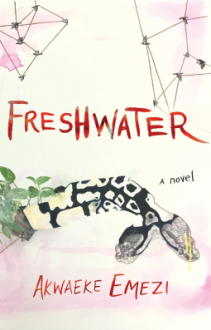The rising demography and demand for potable water have led to scrutinized identification of water pollution sources.

The rising demography and demand for potable water have led to scrutinized identification of water pollution sources.

I had a really tough time getting into this book initially. There's no doubt that the voice of the narrative is interesting, but that doesn't mean it is not confusing. Trust me, it is. Told by the voices in Ada's head—are they personalities indicative of a mental illness or spiritual beings that battle for her attention—Freshwater does not stop to answer questions. This commitment to voice is good for the end result, because it really adds credibility to the narrative, but it does make for a somewhat difficult beginning.
In her debut novel, Akwaeke Emezi crafts a journey that is devastating and empowering. There is much in this story that can break a heart or turn a reader in disgust. Those avoiding difficult subjects in their reads should skip this one. Ultimately, however, Freshwater is a very spiritual tale, a battle for one soul. Despite the many dark moments, it becomes a display of strength and fulfillment. Through lyrical prose and the unrelenting voices, Freshwater explores what it is to be between two worlds—living and dead, Africa and America, Allah and Yeshua, peace and rage.

Akwaeke Emezi is a new, wonderfully fresh, voice to add to the many memoirs of living with C-PTSD (psychobabble below review) and surviving a traumatic childhood. Most go in rote portrayal through X happened, Y is the dysfunctional way we (identity states) dealt with it, Z is the (usually much healthier) way we learned to cope and the place we landed by the writing of the memoir/book.
Instead Emezi gives protagonist Ada and her self-states their own music and more importantly, own heritage, in telling a magical, spiritual, semi-autobiographical story of how the many came to be and worked their way through life to become the person they are now. They are distinctly Nigerian, and all of that Western psychobabble below is inadequate for anyone who hasn't sprung forth directly from a textbook - even for a person who grew up in the West. Imagine how absurd it is to anyone whose background is infused with spiritual aspects, beliefs and legends the West does not allow for.
An ogbanje is an Igbo spirit born into a human body, and this is how Emezi sees her young protagonist's system of being. There is a body and the body plays host to a number of gods and people, each running the whole system from time to time, weaving in and out to deal with the situation. When you think about it, we all have parts of ourselves that take over for certain situations. You at work are not the same you that crawls into bed with a partner at night or the same you who studied hard in university or the same you who did something you may not be so proud of. Everyone's identity works on a sort of continuum.
What Emezi has done so specially is tell her protagonist's story including all of the possibilities. Yes traumatic things happened, but perhaps she was born primed to be more than just one. Perhaps the ogbanje were there, just waiting for a chance to assert themselves. Others are born along the way. We do follow the general arc of birth to present, but the path is gorgeously written, spiritual and magical.
I could either quote the whole book or tell you what happens at every step, but I won't. I will tell you that like many lives, hers is not easy. They are different; Ada's life has more scary places than others. Parts of her react dysfunctionally, she goes "mad." Hard things happen, but they take on significance for the unique way the many who live within the body called Ada cope with each new horror, wonder or challenge.
The prose is lyrical and beautiful even when the events described are not. While it's fantastical, it's also very truthful. Perhaps this much truth can only be safely told by spirits, gods and a little bit of magic. The end is uplifting. If we are going to read "DID Memoirs" or stories of difference - be they about race, states of being, health, illness, whatever, let this be one you read.
-- And as promised, psychobabble:
Complex Traumatic Stress Disorder (C-PTSD) is the newest Western nomenclature for what we used to call Dissociative Identity Disorder (DID) - which itself is the name used since 1994 for something formerly called "Multiple Personality Disorder" - a very misleading and much maligned term/diagnosis. C-PTSD et al are not a personality disorder, but rather the lack of a unified self-state or identity. The identities act as centers of information processing.
The term "personality" means "characteristic patterns of thoughts, feelings, moods and behaviors of the whole individual," while for a person with C-PTSD, the switches between identities and behavior patterns is the personality. So it's just a different way to process the world and oneself. It's not Sybil or the Three Faces of Eve or even very strange. It's called C-PTSD because it usually stems from a trauma so long-lasting or severe that the child creates a complex way to cope.
Glad we cleared that up.
 This is a story about a man figuring out who he truly is. All his life he has been headed in one direction, all business. Work is ruling him.With a steady hand, John pulled his Blackberry from its holster and scrolled through a queue of unread e-mail. He studied the words on the screen and waited for work—his drug of choice—to take hold. Each message was another hit that drove everything from his mind but the next urgent problem only he could solve.
This is a story about a man figuring out who he truly is. All his life he has been headed in one direction, all business. Work is ruling him.With a steady hand, John pulled his Blackberry from its holster and scrolled through a queue of unread e-mail. He studied the words on the screen and waited for work—his drug of choice—to take hold. Each message was another hit that drove everything from his mind but the next urgent problem only he could solve. Rating: 2.5 stars, rounded to 3
Rating: 2.5 stars, rounded to 3